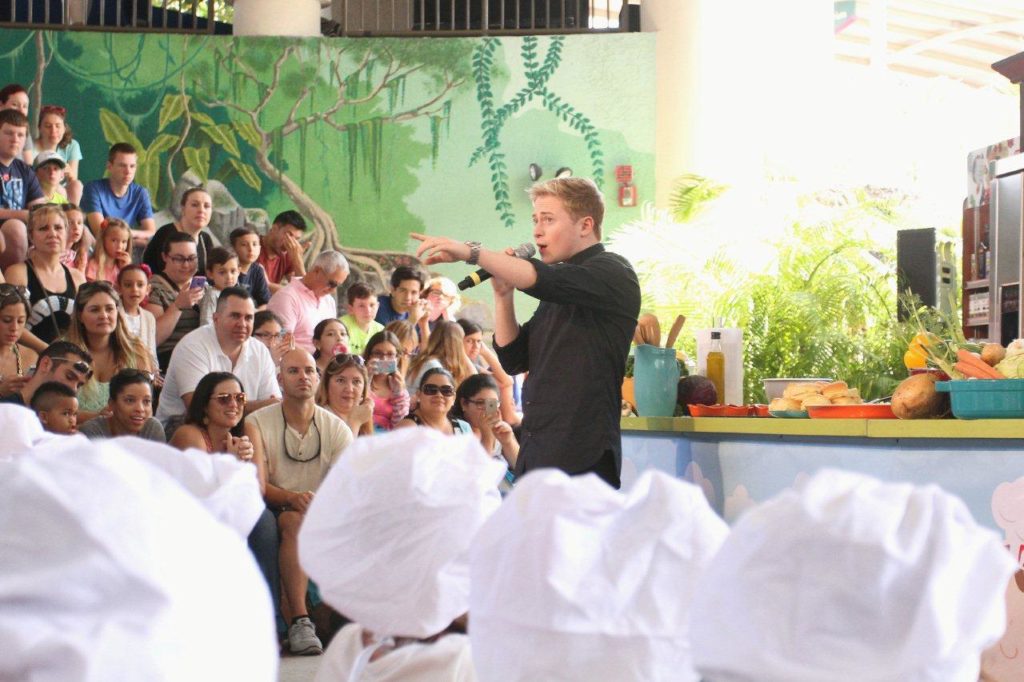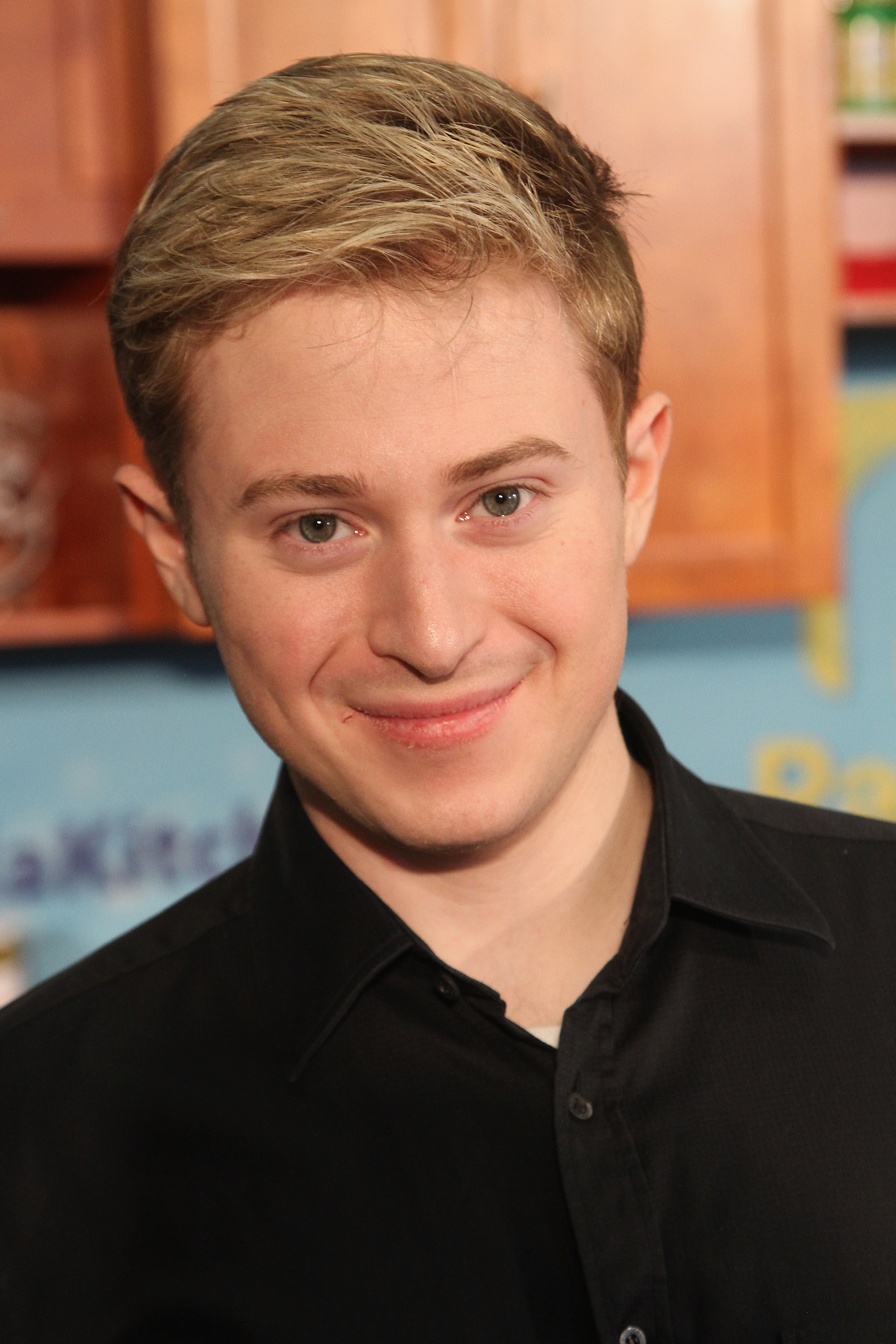Reed Alexander Gets Kids Cooking!

Depending on your age or, more aptly, how old your kids are, you likely remember 20-year-old Reed Alexander as the infamous arch-nemesis “Nevel” on Nickelodeon’s hit TV show iCarly. The actor has a wide array of projects and interests these days. Chief among them is being a youth educator and role model for healthy eating and an active lifestyle, a skill set drawn from personal experience with weight loss and lifestyle change.
IDEA’s editor in chief Sandy Todd Webster caught up with Reed on a quick break between two of the 12 events he was teaching/emceeing over the short span of 2 days at Fun and Fit as a Family Sponsored by Carnival Featuring Goya Kidz Kitchen at the South Beach Wine and Food Festival in February. Events included recipe demos, food labs and emceeing for over 2,000 kids and their families in North Beach Miami’s Jungle Island amphitheater—a kitchen stadium of sorts. Alexander calls this event “the centerpiece of his food calendar” and says he wouldn’t miss it—or the opportunity to get kids and their parents closer to healthy cooking and eating habits—for the world. Read on to learn more about this dedicated proponent for children’s health and nutrition.
Sandy Todd Webster (STW): I actually met you for the first time a few years back here at Fun and Fit as a Family. You were hosting the hands-on food labs for the kids. I think maybe you were around 15 years old then. What compelled you to get involved with advocacy for kids’ food education and with this event?
Reed Alexander: Growing up I was always the overweight kid; I was the last picked in PE. That was kind of my own doing. I wasn’t really into physical fitness and I had to change that for myself. I remember going to my mom one night and telling her ‘I can’t stand how I feel. I’m not happy with how I look in the mirror.’ I watched myself on an episode of the show and thought ‘Wow, I really need to pull it together.’ I don’t think I was massively overweight, but I needed to shape up or I would have been very quickly.
STW: What was your approach to weight loss? What were some of your challenges during the process?
Reed Alexander: I definitely had to work at it. It was time consuming. It took about 6 months for me to lose 15 pounds. The biggest takeaway for me was—and is—that I am a work in progress. It’s not like you can lose the weight and then go back to eating chocolate cake and whatever else you want. You’ve got to be mindful. I remember the intimidation of thinking. ‘Oh my gosh, I just worked so hard on this, what if I gain it back?’
Also, take it one step at a time. I think people try too hard by taking the all-or-nothing approach, as in, ‘We’re going to cut out all sugar; we’re going to cut out all dairy.’ That works for some
people, but it can be very difficult for others. It’s great to have those goals, but do it gradually. You end up feeling so deprived that you return to eating all of the ‘bad’ things again and you go back to the old habits, because it doesn’t stick. Make it realistic. Don’t make it so stressful for yourself.
STW: Most people fail during maintenance. You’ve maintained for about 6 years. Do you have a secret weapon for keeping the weight off?
Reed Alexander: I think maintaining it is harder than losing it. Developing a healthy eating regime has been key. Maybe when you were dieting you weren’t eating this cookie or other sweet, but maybe now you feel you can indulge a little. ’Should I? Should I not? How much can I have? Proportions?’ You have to develop a different language—a different approach to food.
STW: After your personal weight loss journey, how did your involvement in food education for youth evolve?
Reed Alexander: In 2010 I launched a website called KewlBites, which is all about healthy living and exercise/lifestyle. Once I had figured out some ways to lose weight and eat right, I started cooking [around age 14]. I wanted to share all of this with other kids. It grew to consume as much of my life and energy as the acting did. I was blogging, writing, developing recipes, and eventually cooking on TV and the Today Show. Then President Clinton called and invited me to be an ambassador for the Clinton Foundation’s Alliance for a Healthier Generation. That culminated in my coming to SOBEWFF Fun and Fit as a Family. In 2012, my first year here, AHG was an event supporter.
STW: Based on what you see here and when you visit schools around the country as an AHG ambassador, what are kids struggling with in terms of understanding food and nutrition?
Reed Alexander: One of the big challenges is that kids don’t know much about their food or about ingredients. For example, when I tell them we’re going to chop up an egg white and a yolk, I ask them to tell me why they think we aren’t using as much yolk as white. They really don’t know. Or I’ll tell them we’re going to add in the mustard, and they automatically go ‘Iwww!’ without tasting it or knowing how it will shape the dish. They either have stigmas about food or they’re not taught the information.
STW: Isn’t that just part of kids being kids?
Reed Alexander: I kind of went through the same growth spurt. Some of the kids here are really young—6-7 years old. There’s that missing link where they need to be taught or shown. Showing them that adding chives and tarragon is not going to be like, ‘yuck,’ but delicious, is the ‘why’ of being here. They just don’t know because they’ve never been exposed.
STW: How do you work that into teaching moments with youngsters?
Reed Alexander: Today we put one particular ingredient at each of the 17 stations where the kids were based. As we progressed we got the kids engaged in these ingredients. They could touch, smell and taste them, and they could bring them up to me and ask questions. It was very interactive. They asked me things like ÔÇÿWhat is tomato paste? What is this strange oregano? Is it going to taste weird? What if I don’t like that?’
It was interesting to observe when we topped off the chili we made with chips, I saw kids taking tons of them. There were so many of them doing it. It was important at that point to say ‘Now just a second. Before we take a huge mound, why not just take a little bit and see if it does the trick?’ I think some of them got the difference that maybe they didn’t need so much—a little goes a long way. Less is more. Then it clicks. They get it. They’re just not raised to think that way about it.
STW: How does the hands-on cooking or handling of food benefit kids?
Reed Alexander: I grew up in a household where we didn’t cook all the time. So I never really had a familiarity with what the kitchen was all about until I got in there on my own. For the kids to have this experience at Fun and Fit as a Family, hopefully they take a little bit of that away. I just try to share with them that healthy cooking can be delicious; that it doesn’t have to be complicated; and that the ingredients can be fresh and tasty. They can use things they have in their own home. Here in Miami where the air is warm year round, kids could do a little herb garden or herb pots. It’s interesting, it’s educational and the kids see that they’re eating something that’s coming from the ground—not just from a package.
STW: Do you have any takeaways for our fitness professional readers that might help them with their own kids or help them with advice for clients with children at home?
Reed Alexander: It’s cliché, but family dinner makes a difference. It’s not just the time at the table, but the time it takes to prep for that. Maybe mom, dad and the kids get together on a Sunday and plan out what the food week looks like; or maybe the family gets together and makes things ahead. When everyone is working together, it kind of makes you closer. Maybe it reveals to mom and dad the areas kids are lacking in their food knowledge and food skills. It could be a little bit of an intervention time.
I think a great thing you can do is to plan certain themes. Everyone is so busy now, we don’t have time to cook dinner five nights a week, but maybe set aside a weekend night to do a healthy taco night. ‘We’re going to cook together. You’ll make the mixture, I’ll get the tortillas going in the oven. We’re going to introduce you to cookware XYZ.’ That way, everyone has a job.
Another thing you can do is grocery shop with your kids on a weekend morning or after school. Be very observant. What is it they want? If it’s not a healthy choice, what can you introduce them
to instead? If they want the sugary cereal, maybe you compromise by saying we’re getting this oatmeal instead, but we’re going to get all of these great toppings. Let them help you pick the healthy toppings. They still feel like they have ownership and can step into the cockpit. You’re just gently steering them away gradually from some of the things that are unhealthy.
Finally, listen to your kids. I find it’s very surprising we always count kids out when it comes to nutritional knowledge. We think they don’t know or don’t care. But kids really care. I’ve had the chance to visit a lot of schools through the Clinton Foundation and I’m shocked sometimes to be asked what my favorite vegetable is instead of what it’s like to be on Nickolodeon!
Listen to them to find out what kinds of food they like. Is there anything exotic they’re open to? Maybe you do a theme that’s travel inspired. Maybe you do a geography connection. Maybe they’re studying a certain part of the world in school. Make a fun recipe that represents that. But see what they’re interested in; tell them to pick whatever vegetables they’re interested in in the grocery store. Let them make some decisions. Let them make mistakes and stumble a little bit in the food space while you’re there to guide that.
Learn more about Reed Alexander’s food-related projects; his book KewlBites, full of healthy eating tips and recipes for kids; and his appearances at www.KewlBites.com.
PHOTOGRAPHY: Getty Images
Sandy Todd Webster
For 22 years, Sandy Todd Webster was the chief architect of IDEA's content program - including the award-winning IDEA FITNESS JOURNAL and IDEA FOOD & NUTRITION TIPS - the industry's leading resources for fitness, wellness and nutrition professionals worldwide. She created, launched and nurtured these brands and many others during her productive and purposeful IDEA tenure. Sandy is a Rouxbe-certified professional plant-based cook and a Precision Nutrition Level 1 Coach who is pursuing a Master's degree in Sustainable Food Systems through The Culinary Institute of America (expected August 2024). She plans to combine these passions with her content expertise to continue inspiring others to make the world a more just, healthy and regenerative place.







